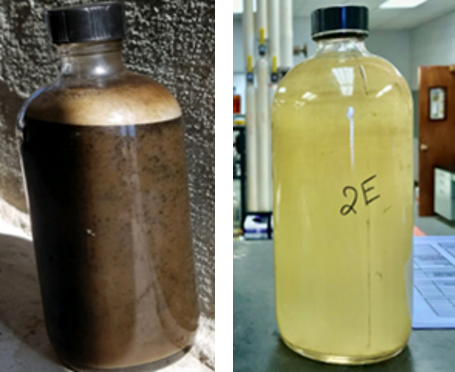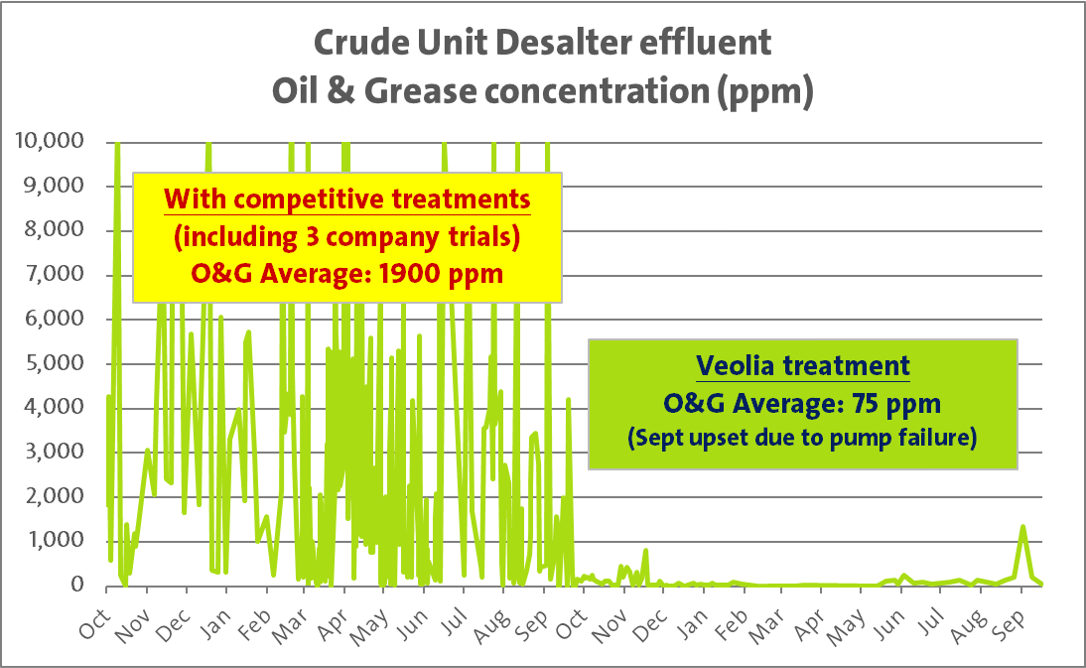
一家中部大陆的炼油厂需要加工大量的加拿大沥青基重质原油,其脱盐装置和废水处理作业的性能受到了不利因素的影响。处理这种机会原油会造成油水乳化层控制的不稳定,而且从脱盐装置流出的盐水中油和油脂(O&G)的含量很高(见图1)。
盐水中的O&G含量给废水处理设施带来了巨大的挑战。为了防止超出工厂的排放限制和因违规而遭到罚款,必须降低机会原油率并削减原油吞吐量。
想要做到这些,需要使用解决方案来提高这些重质机遇原油的混合灵活性,同时又不造成脱盐装置的故障和盐水中过多的油和油脂。几家有竞争力的工艺处理公司进行了三次试验,均未能改善这种情况。
为了设计一种化学处理方案,最大限度地提高原油加工的机会,同时从脱盐装置中产生无油的盐水,Veolia在几个月内对多个脱盐装置样品进行了现场模拟和实验室工作。
这种深入的鉴定样品协议有助于结合原油、原油混合物和工艺参数的变化构建一个强大的处理程序。
Veolia有信心通过新近获得专利的创新处理解决方案BrineCLEAN解决所有操作模式下的挑战。其中,对脱盐装置连续排渣冲洗的解决方案尤为关键——该环节对维持脱盐装置清洁度具有决定性作用。

图 1 - 未经处理(左)和经过Veolia处理(右)的盐水流出物
结果
启动Veolia的专利脱盐装置盐水质量保证程序BrineCLEAN后的最初几个小时内,脱盐装置中的油水乳化层减少了~30%。同时,脱盐装置的出水盐水O&G含量降低了95%以上(见图2)。
在采用BrineCLEAN方案之前的两年,出水盐水中的O&G平均为1,900 ppm,其中包括由竞争工艺公司进行的三次试验,都没有产生效果。
使用BrineCLEAN的第一年,出水盐水中的平均O&G水平为75ppm——下降了96%。
该炼油厂得以处理更高比例的重质机会原油,据估计,这使得该厂的利润提高了超过150万美元/年。
此外,Veolia的BrineCLEAN程序还提供了其他几项重要工艺优势,包括:
- 稳定的脱盐器操作,运行成本较低:
- 增加盐和固体的去除量,增加油/水的混合,减少化学品的消耗。
- 在设计流速下连续洗泥,脱盐器更清洁
- 提高废水处理厂的稳定性,使其在满足排放规范方面具有更高的可靠性,同时降低了运行成本。
- 减少原油预热交换器设备组中的污垢,从而降低了能耗和维护成本。
- 降低原油塔顶的氯化物,提高资产可靠性并降低塔顶化学处理成本
- 降低废油回收和再处理成本。

图2 - Veolia专利方法处理前后的脱盐盐水油污
